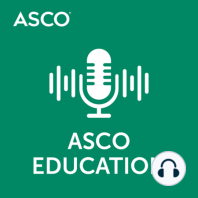6 min listen
Cancer Topics - Increasing Diversity in Oncology Practices (Part 2)
FromASCO Education
ratings:
Length:
23 minutes
Released:
Oct 12, 2022
Format:
Podcast episode
Description
"Have you ever struggled to remember or pronounce a colleague’s foreign name? In part two of this ASCO Education Podcast episode, host Todd Pickard (MD Anderson Cancer Center in Houston, Texas) continues the conversation on creating more inclusive oncology practices with medical oncologist Dr. Timothy Gilligan and clinical psychologists Dr. Lauren Wadsworth and Dr. Stephanie Pinder-Amaker. They explore identity-related aggressions in the workplace and tips for practicing to recognize and address them. If you liked this episode, please subscribe. Learn more at https://education.asco.org, or email us at education@asco.org." TRANSCRIPT Todd Pickard: Hello, my name is Todd Pickard. I'm a PA specializing in genitourinary cancers at MD Anderson Cancer Center in Houston, Texas. This is the second half of our Cancer Topics conversation on increasing diversity in Oncology, with Clinical Psychologists, Dr. Lauren Wadsworth and Dr. Stephanie Pinder-Amaker, and Medical Oncologist, Dr. Timothy Gilligan. In part one, we discussed workforce diversity in Medicine in the various prejudices, biases, and microaggressions that can take place in the workplace. We also explored real-world examples of bias in healthcare from Dr. Wadsworth and Dr. Pinder-Amaker's book, Did That Just Happen?! Today, we're going to continue our conversation by exploring cultural-sensitivity tips for individual healthcare providers and practices. Welcome, everybody. You know, we could have a great conversation about this for hours, I'm really enjoying this conversation, but I do want to get back to the book. Dr. Wadsworth, are there any anecdotes from the book that you would like to share with us that might illustrate some of the things that we've been discussing so far? Dr. Lauren Wadsworth: Yes, we would love to. So, each chapter of the book starts with a real story. So, a vignette that's been de-identified of an identity-related aggression happening in the workplace, or some other type of, Did That Just Happen?! moment, as we like to call them. And then after the vignette, we break down what was problematic about that dynamic and what to do about it, both in the moment how to make a repair, and how to change your workplace culture to prevent this kind of thing from happening again, or to reduce the incident. Our hope was that if we started with vignettes, to a point that you made, Todd, earlier, we might be able to welcome folks in that are maybe on the fence about reading a book like this, and instead of bringing up defensiveness, trigger empathy. So by telling a real story, our hope is that folks will have empathy, come up, and then curiosity about how they might be able to do things differently. Dr. Stephanie Pinder-Amaker: The title of the chapter is, “What's in A Name?”, and this is Dr. Daisy's story. "Adaeze Adebayo-Opeyemi arrived as the highly recruited young doctor to a tier-one academic medical center on the West Coast. Like many young professionals of color, she had grown accustomed to being one of the few or the only physician of color in her class. Throughout her medical training, she'd rarely seen her identities reflected among the professional staff but knew that she could readily find people who looked and perhaps sounded like her among the hospital's food services and environmental services staff. Sometimes she retreated to those spaces for respite." "Dr. Adebayo-Opeyemi knew exactly how to respond to her patients' surprise when she introduced herself as their doctor. She knew to pause and wait for them while they awkwardly set aside the meal-request cards they had hurriedly tried to complete when seeing her enter the room. She knew to take a deep breath when they scanned the room for some external confirmation of her credentials - perhaps a nod from an approving white hospital staff member - if she was headed toward their medical chart. Along with reading a chest X-ray and delivering devastating lab results, she had honed these skills in medical sch
Released:
Oct 12, 2022
Format:
Podcast episode
Titles in the series (100)
Self-Evaluation: NSCLC Treatment Metastatic: Self-Evaluation: NSCLC Treatment Metastatic by ASCO Education
